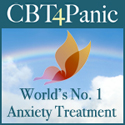Remembering the Terror

A form of anxiety disorder, post-traumatic stress disorder (PTSD) is sometimes formed after someone has experienced a very terrifying ordeal, usually where serious physical damage could or did occur to the person involved.
Events that can trigger PTSD to occur include violent attacks on people e.g. muggings, rape, human caused or natural disasters, and military combat. Once someone has PTSD they often find it to be hugely disabling.
In terms of PTSD symptoms, those affected tend to re-experience the worst parts of their horrible past in the form of memory flashbacks and nightmares/ frightening thoughts.
Other symptoms of PTSD are numbness to emotions, depression, poor sleeping ability, anxiety, and outbursts of anger and general irritability. Powerful emotions of guilt are also common. If symptoms like these endure for over one month PTSD can then be diagnosed.
PTSD can affect any age, from children right through to the elderly. Symptoms are likely to show themselves within three months of a particular traumatic event.
Once apparent this illnesses duration and severity are variable, lasting from just six months to many years.
Other problems can sometime become associated with PTSD, e.g. alcoholism, substance abuse, co-occurring depression and other types of anxiety disorder.
Gastrointestinal complaints, dizziness, problems with the patient’s immune system, headaches or chest pains, amongst numerous other possible bodily ailments are not unusual.
What is important is that quick, effective diagnosis and treatment of these conditions occurs, so as to provide the best chance of treatment success..
Individuals more open to developing PTSD are those that have suffered abuse when a child or people who’ve undergone highly traumatic experiences.
Today’s society is becoming increasingly terror-filled. Research has made treatment of this disorder more available.
It is possible that in the near future, a standardized treatment model will be produced that can end the suffering of many who suffer PTSD.









